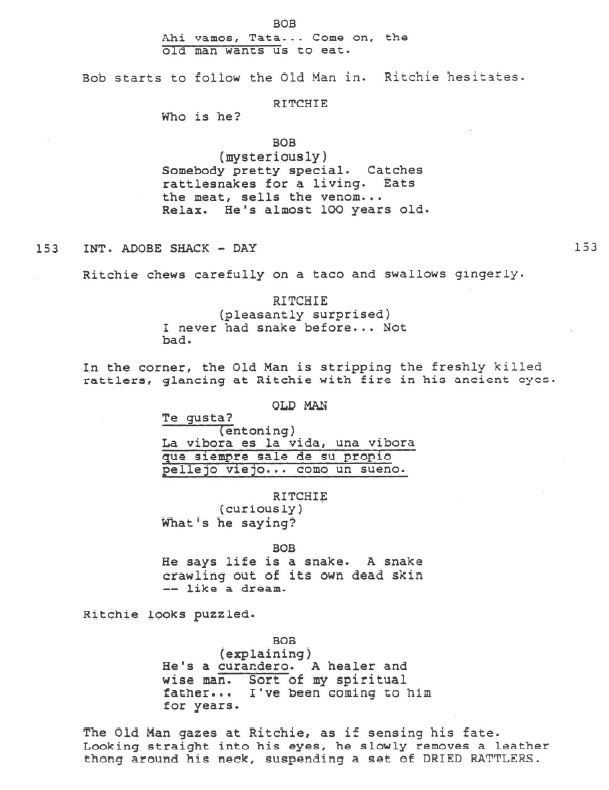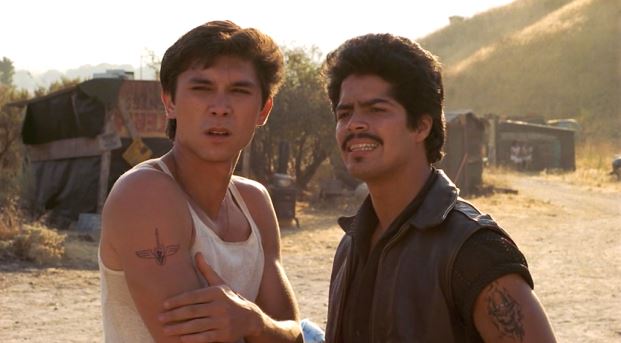This Week's Script Cavalcade: La Bamba
This week on Script Cavalcade, we’re plumbing the mythological subsurface of Luis Valdez’s La Bamba (1988). The rollicking musical biopic celebrates its 30th anniversary this year with a handful of different screenings around LA and beyond. Writerly fans of La Bamba will be pleased to know that the WGF Library has two drafts of the screenplay in its collection – and one of them is signed with encouragement by the maestro himself.

The film tells the story of early, pioneering rocker Ritchie Valens of Pacoima, California, who died at 17 in the same plane crash that killed Buddy Holly, but not before changing the face of American popular music by adapting a traditional Mexican folk song “La Bamba” into one of the most enduring rock hits of all time. A one-time migrant farmworker, Valens (whose birth name was Richard Valenzuelas) is a fantastic example of Mexican-descended influence on roots music and early rock ‘n roll. By telling Valens’ story, Valdez reveals an under-explored aspect of music culture, creating a folk icon for everyone, but especially for those who don’t get nearly as many opportunities to see themselves presented as nuanced heroes of their own big-screen narratives.

Luis Valdez, known widely as the “Father of Chicano Theater,” isn’t so much a screenwriter or playwright as he is a mythmaker. When we think of mythology, we often think of deeply traditional narratives and sacred stories that seek to explain the origin of the world, death and human nature. Such stories are often about Gods, heroes, animals or personifications of natural elements like mountains and sky. Valdez’s gift as a writer is his ability to make commentary on everyday life and the present-day social order by spinning it into myth. By reaching for the mythic underpinnings in his stories, Valdez elevates his narratives to the highest level of storytelling. That’s why his writing feels universal and endures.
This week, I present you with one simple scene. In La Bamba, like any great hero, Ritchie must look inward and connect with his roots to discover his power and his identity. In this case, Ritchie finds himself waking up hungover in Tijuana with a bizarre, old medicine man. The drama is laden with symbolism and has a kind of ancient subtext eking out of its pores. These are ideal study pages for writers looking to unearth the macro/mythic/universal-level themes in their personal stories. It's motivation for all of us to study and connect with our own ancestry and culture – wherever it might originate -- in order to draw from it in our work.




As a writer, seeing things on a mythological or cosmogonic level involves stripping away modern formality. In contemporary society, we often define ourselves by our professions, i.e. – “I’m an attorney;” “I’m a football player;” “I’m a sales technician,” etc. Writing at the mythic level involves looking beyond certain contemporary social constructions like one’s job title. Many ancient peoples believed that individuals had specific destinies—to become warriors, healers, wanderers, teachers or storytellers and that it was an individual’s job to realize one’s destiny and to journey to become it. If we look at life as though it is a myth and we view our own experience as though we’re heroes and heroines on a journey to discover who we are, we find certain universal rites of passage and we encounter people who initiate, instruct and heal us in different ways. If there don’t appear to be healers and shamans in modern society, it's only because we’re not looking hard enough. The best writers—like Valdez—are not only able to see them, they’re able to reveal them in their writing.

Knowing that his lead character dies in a plane crash, Valdez is able to shape his script with the benefit of hindsight. He shows us Ritchie’s continual nightmares about his own death. By including a scene where Ritchie encounters a Curandero, or healer, who seems able to see into his soul and his fate, the writer makes a comment on existence in general, that it’s bigger than we could possibly understand and that death is an innate part of it, but also that death is a portal into something much, much larger and more infinite. This is more than just a musical biopic; it’s writing that makes us feel less alone and afraid because it taps into timeless aspects of personhood that affect every single human.

These are just a few things for you to contemplate the next time you sit down at your laptop.
If you’re looking for more scriptly wisdom to be inspired by, check out some of the library’s newest acquisitions.
- Black Mirror’s Emmy-Winning "San Junipero" written by Charlie Brooker.
- The Florida Project written by Sean Baker & Chris Bergoch.
- The Glass Castle written by Destin Daniel Cretton & Andrew Lanham based on the memoir by Jeannette Walls.
- Scripts from 2008’s TNT series Leverage, seasons 1 and 2.
- The entire 1st season of NBC’s Marlon.
